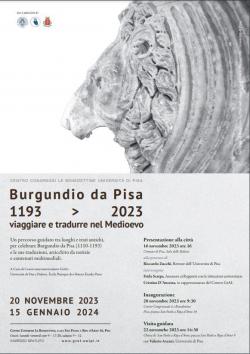
BURGUNDIO DA PISA (1193-2023): travelling and translating in the Middle Ages
A guided tour through ancient places and texts, to celebrate Bungundio da Pisa (1193-2023) and his translations, enriched with news and multimedia content.
Thursday 16 November at 4 pm at the Sala delle Baleari of Palazzo Gambacorti will be held the opening meeting of the event. Informative moment at which will intervene the Councillor for Relations with the University of the Municipality of Pisa, Frida Scarpa, the Rector of the University of Pisa, Riccardo Zucchi, and Cristina D’Ancona, professor of history of medieval philosophy at the Department of Civilization and Forms of Knowledge of the University of Pisa and director of the Center of Interuniversity Studies GrAL (Greco Arabo Latino).
The guided tour on Burgundy and his work will take place on the occasion of the annual study meeting of the GrAL center, this year dedicated to the translations into Latin, Syriac, Armenian and Arabic of a work on the cosmos falsely attributed to Aristotle, scheduled from 20 to 23 November at the Congress Center Le Benedettine. The itinerary is dedicated to the lawyer, diplomat and translator from Pisa, whose death is 830th anniversary.
The exhibition at Le Benedettine Centre will be open until 15 January 2024 according to these times:
- Monday to Friday 9 am -5:30 pm;
- Saturday 9 am -12 pm;
PROGRAMME
20 November at 9:30 am, opening at the Le Benedettine Centre;
22 November at 2:30 pm, guided visit to the Church of San Paolo in Ripa d'Arno with Professor Valerio Ascani, University of Pisa;
BURGUNDIO DA PISA
Today less well known than Fibonacci, who spread the mathematics of the Arabs in the Latin-speaking world, but no less important, Burgundy of Pisa was among those who in the twelfth century contributed to the new cultural momentum that would characterize the following centuries, inaugurating the long and fascinating path that leads from the Middle Ages to the Renaissance.
A refined translator from Greek, always travelling between Pisa and the East, Burgundy with his work favoured, in fact, the circulation of philosophical and scientific works which had such importance in the development of modern thought. He, for example, was responsible for the translation, in whole or in part, of many of Galen’s works on which the teaching of medicine in Montpellier, Paris, Bologna and Padua was based. But Burgundy was a tireless translator: philosophy, theology, medicine and law.
The memory of Burgundy of Pisa, who died on October 20, 1193, until today has been entrusted almost exclusively to the marble inscription placed on his tomb preserved in the church of S. Paolo in Ripa d'Arno and recently restored. Here, in the epitaph, his contemporaries celebrate him as “Doctor of doctors”, “precious gem of teachers” who “taught as much the rules necessary to poets as the art of doctors” and who “everything that is human, or that belongs to the earth, or that is under the sun, or that is possible to know, [...] knew”.
830 years after his death, his figure has been brought back to light by studies conducted by the Interuniversity Studies Centre GrAL (Greco Arabo Latino), which was founded in 2006 by an agreement between the University of Pisa and the University of Padua and which today includes scholars from: University of Naples Federico II, University of Pavia, University of Rome “La Sapienza”, University of Turin, Accademia dei Lincei di Roma, Centre national de la recherche scientifique (CNRS), École Pratique des Études (Paris), Commissio Leonina (Paris), Institute of Ismaili Studies (Oxford).